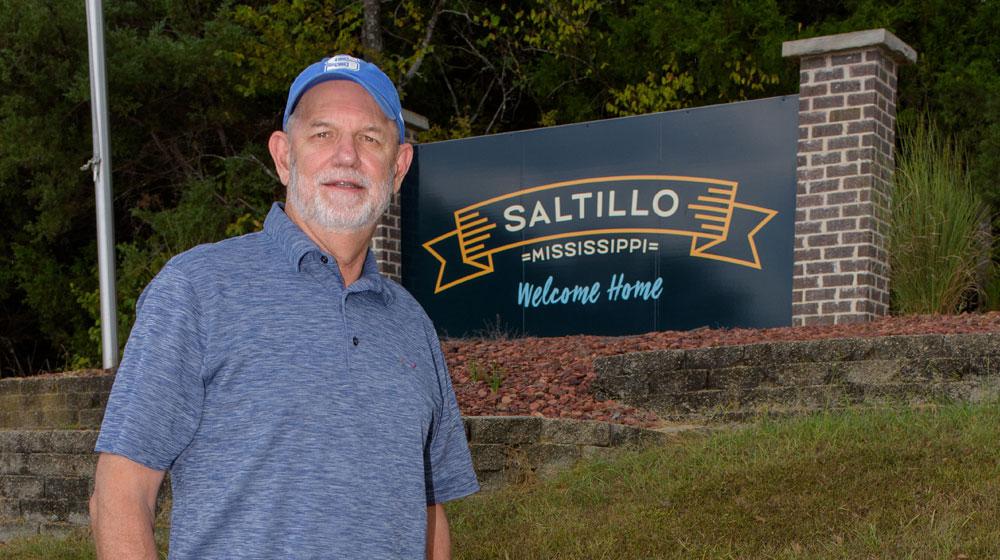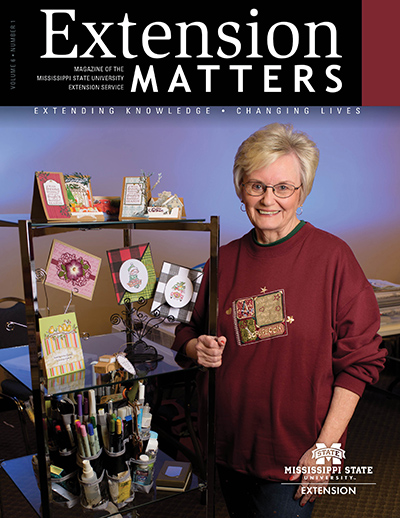Crystal Clear

Lee County is working on producing clear and safe water.
Extension helps community connect to improved water supply
Story by Keri Collins Lewis • Photos by Kevin Hudson
Turning on a water faucet typically produces a clear and safe product. If that doesn’t happen, there’s trouble.
Rapid local growth put pressure on Saltillo’s infrastructure, including the water systems the town’s citizens rely on. Over the past three decades, various water sources have had mixed results in providing suitable water to all customers in this small Lee County community north of Tupelo.
Switching from river water to well water in 2016 provided substantial cost savings, but some customers experienced a marked decrease in their water quality. High levels of iron and manganese, while not a health hazard, resulted in smelly, cloudy, brown water.
Video by Keri Lewis
In July 2018, the city was ready to switch to surface water supplied by the Northeast Mississippi Regional Water Supply District, but they could not legally increase rates for everyone to offset the cost of switching. They needed the approval of the Mississippi Public Service Commission (MPSC) to raise rates for customers living more than a mile outside the city limits.
While city leaders weighed their options, the MPSC authorized a “prudent and economic management audit” to help clarify the situation. That is where Dr. Jason Barrett came in. An assistant professor with the Mississippi State University Extension Center for Government and Community Development, Barrett’s experience with public water systems and policy, and background as an agricultural economist, gave him the right skillset to help.
Saltillo Mayor Rex Smith’s positive experiences with Extension helped mitigate the frustration of this new delay.
“Having attended many classes which were led by Extension, I have always had a high opinion of them,” he shares. “Dr. Barrett was very easy to work with. He was straightforward with us and was always willing to answer any questions that we had.”
Barrett was impressed by city officials’ desire to make the right decision.
“At their core, they wanted to do what was best from the perspectives of finances, water quality, and the long-term impact of their decision, but they didn’t know how to get to that decision,” Barrett explains. “My job was to do the research and identify all of the factors to weigh, and then use the data to make a recommendation.”
Barrett looked at the existing physical systems: elevated tanks, wells, treatment rooms, and plants. He took water samples throughout the system to get an idea of water system quality on his first visit.
Next, he conducted interviews with Saltillo’s aldermen and mayor.
“It was important to gauge their knowledge of the situation and what they saw as solutions to the situation,” Barrett shares. “They are part of this community and have been dealing with these issues for some time.”
On his third visit, he reviewed their financial information to be sure any recommendations he made were financially sound.
Barrett’s final trip to Saltillo was to present his report at a public hearing. MPSC staff, city officials, and about 100 citizens attended the hearing.
Smith says some things in the report surprised him, that the report was very thorough, and that the attention to detail provided evidence of Barrett’s knowledge of water systems.
Based on the research, Barrett recommended switching from well water to surface water supplied by Northeast Mississippi Regional Water Supply District—in line with the city’s original plan. “While neither the aldermen nor the public wanted to raise water rates, both seemed to accept the report as factual and were pleased to have an independent opinion,” Mayor Smith explains. “We now have the confidence to move forward knowing that the rates we are putting in place have that independent basis that our customers can accept.”
The switch from ground water to surface was completed in December 2019.


